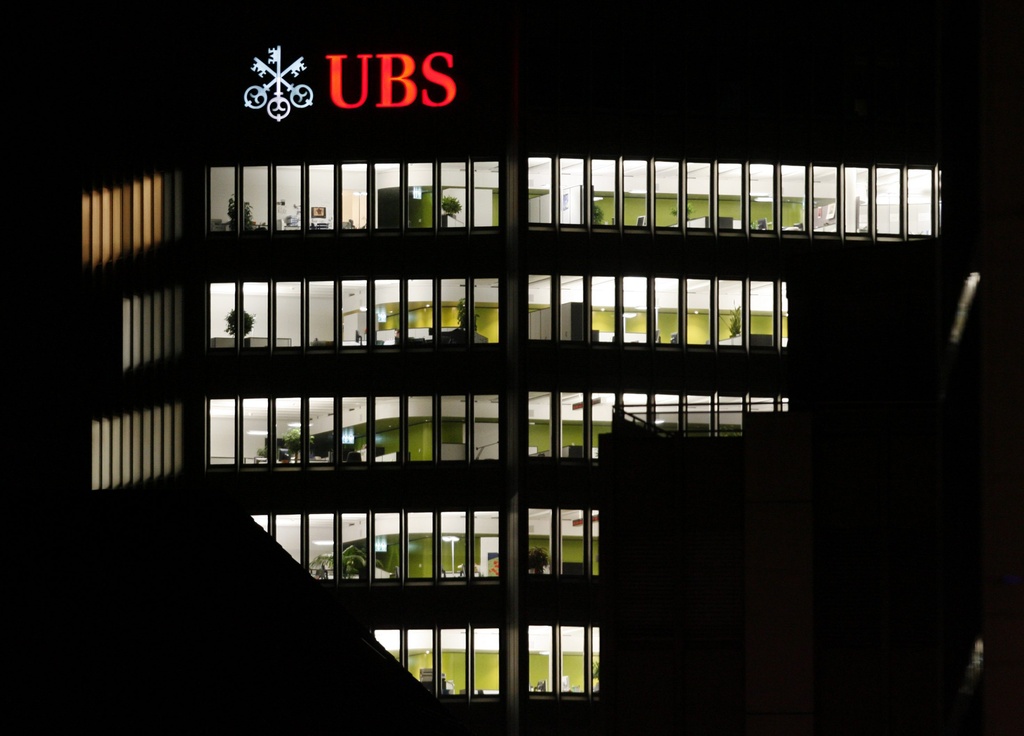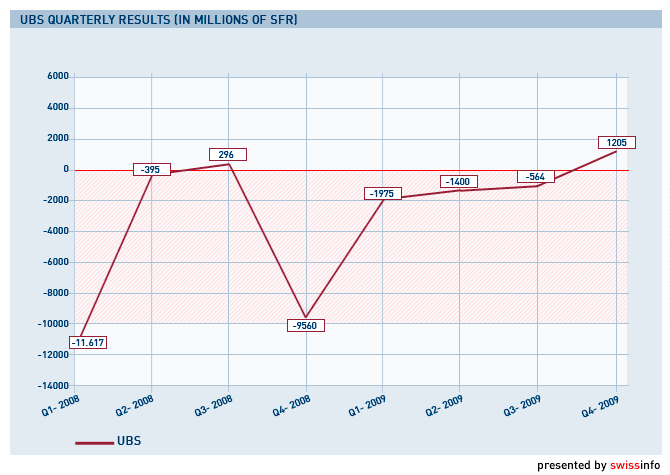
Will long-lost profits lure back UBS clients?

Swiss bank UBS on Tuesday heralded its long-awaited return to profitability as a possible turning point in its bid to stem a massive outflow of client funds.
UBS posted a fourth-quarter profit of SFr1.21 billion ($1.12 billion) but also said clients had withdrawn SFr56.2 billion over the same period, an escalation of the problem that saw the bank lose assets worth SFr147.3 billion in 2009.
The fourth quarter withdrawals included SFr33.2 billion from UBS’s core wealth management and Swiss bank business, nearly double the SFr16.7 billion outflows in the previous three months.
“We expect that our return to profitability will increase clients’ confidence in UBS and restore our reputation,” chief executive Oswald Grübel said in a statement. While acknowledging it would take time, Grübel later repeated his assertion in front of the media that a continuation of black figures should stop the outflows.
The statement of confidence harked back to the unveiling of a new strategic plan last November, which predicted that a return to sustainable profit and a renewed focus on customers would restore confidence in UBS’s wealth and asset management capabilities.
However, the bank admitted during its results presentation in Zurich on Tuesday that forces outside its control were also sucking assets away. A recent Italian tax amnesty affected SFr22.8 billion in assets, while pressure continues to mount from other countries.
Deal or no deal
Last month, a Swiss court ruling cast doubt over the validity of a deal struck with the United States authorities to hand over details of 4,450 UBS clients. If that deal falls down, some observers believe UBS could be dragged back to the courts – further eroding its name in the US.
French authorities recently bought stolen client data from HSBC’s operations in Geneva, and Germany is now moving toward a similar deal involving information from unknown Swiss banks.
Grübel insisted there was no evidence data had been stolen from UBS but acknowledged the new twist in the tax evasion saga could herald more trouble. “If [governments] induce people to steal data then that changes the environment,” he said.
This new environment could conceivably trigger a general flight from Swiss banks by clients fearing that their anonymity could be compromised.
A further problem that UBS must tackle is the flight of client advisors to other banks. Some 200 advisors left UBS in the last three months of 2009, half of them from their own volition.
Star advisors who jump ship voluntarily pose the biggest headache for any bank and are estimated to take some 40 per cent of their clients with them.
Grübel admitted the phenomena could take several months to die out. In other words, until UBS starts consistently pulling in profits every quarter it risks losing talent.
“All we can do is improve our offer to clients and improve our credibility,” Grübel said.
Key staff
However, Grübel denied UBS was losing key staff to better-paying banks. Bonus payments in 2009 increased to SFr3 billion from SFr1.7 billion in 2008 despite fierce public criticism. The bonus pool in 2009 also went to fewer staff, as UBS had aggressively cut jobs.
Grübel was also adamant that the Switzerland’s financial regulator had not interfered to cut the bonus pool, despite some press speculation to the contrary. “There was no interference as such from the regulators. They do want to know about bonus pools these days. They were informed, but that is all,” he said.
Analysts were mixed about UBS’s chances of turning back the tide in the foreseeable future.
“The money outflows will dominate the discussion today so the share will likely come under pressure,” Kepler Capital Markets analyst Dirk Becker told Reuters. “The one big [thing] they achieved was to get back into profit in the fourth quarter, but it was expected. Obviously it would have been worse if they had not managed to do this.”
Bank Sarasin had a more optimistic outlook. “The return to profitability in [the fourth quarter] and realistic management expectations for 2010…are a milestone in regaining trust and turning [net new money] into positive,” Sarasin said in a note.
Matthew Allen, swissinfo.ch and agencies
Operating income
2009 Q4: 6,095
2009 Q3: 5,776
2009: 22,601
2008: 796
Operating expenses
2009 Q4: 5,183
2009 Q3: 6,359
2009: 25,162
2008: 28,555
Net profit
2009 Q4: 1,205
2009 Q3: -564
2009: -2,736
2008: -21,292
Net new money
2009 Q4: -56,200
2009 Q3: -36,700
2009: -147,300
2008: -226,000


In compliance with the JTI standards
More: SWI swissinfo.ch certified by the Journalism Trust Initiative


























You can find an overview of ongoing debates with our journalists here . Please join us!
If you want to start a conversation about a topic raised in this article or want to report factual errors, email us at english@swissinfo.ch.